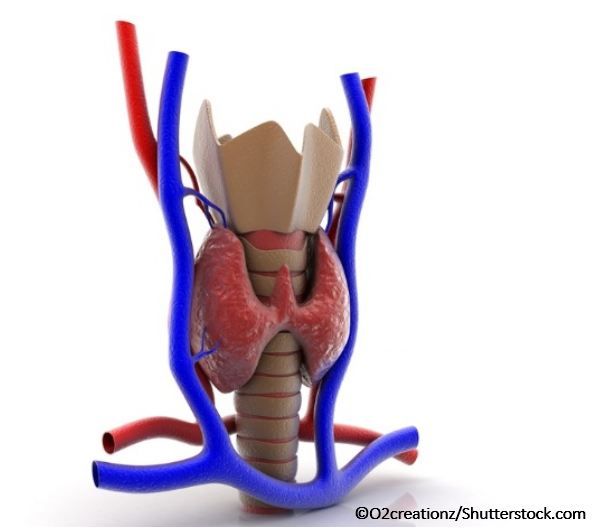Article
Levothyroxine Fails to Normalize Cholesterol Levels in Hypothyroidism
Author(s):
A new study suggests it may be time to scrutinize the efficacy of the longstanding standard of care for hypothyroidism.

Standard hypothyroidism treatment falls short in normalizing high cholesterol levels, according to a new study, published in The Journal of Clinical Endocrinology & Metabolism.
The standard of care for overt hypothyroidism is levothyroxine at doses that normalize serum thyroid stimulating hormone (TSH) levels. Untreated hypothyroidism is well known to raise cholesterol levels. The results of the new study suggest levothyroxine therapy may not truly be normalizing cholesterol levels in patients who use the drug to replicate adequate thyroid function.
“Our data are consistent with the animal models. We have to re-evaluate our guidelines on the standard of care for hypothyroidism,” said lead author Elizabeth McAninch, MD, assistant professor in the Division of Endocrinology and Metabolism at Rush University Medical Center, Chicago, Illinois.
McAninch and colleagues reviewed studies of overt hypothyroidism in which patients were treated with levothyroxine to normalize serum TSH levels. They searched databases for studies that reported other objective markers of thyroid hormone signaling, including serum low-density lipoprotein (LDL), total cholesterol, sex hormone-binding globulin (SHBG), creatine kinase and/or ferritin levels, as well as cognition, energy expenditure, and/or renal function.
Levothyroxine was administered as monotherapy for overt, primary hypothyroidism among non-pregnant adults with normal serum TSH levels. For studies with LDL, total cholesterol, and SHBG outcomes, data were pooled using random effects meta-analysis.
A total of 99 studies met inclusion criteria, including 65 studies that reported serum cholesterol data. The meta-analysis showed that levothyroxine-treated hypothyroid participants with normal serum TSH levels had 3.31 mg/dL higher serum LDL levels and 9.60 mg/dL higher serum total cholesterol levels vs controls.
In studies that did not concomitantly assess healthy controls, serum LDL levels were 138.3 mg/dL and serum total cholesterol levels were 209.6 mg/dL. A meta-analysis of 2 studies showed no significant difference between SHBG levels of levothyroxine-treated participants and controls.
The researchers concluded that, “In studies that utilized levothyroxine monotherapy at doses that normalized the serum TSH for overt, primary hypothyroidism, not all systemic biological markers of thyroid hormone signaling were normalized, including serum LDL and total cholesterol levels.”
The new study looks “specifically at objective metrics of thyroid hormones,” said McAninch. She noted due to the diversity of the studies, the researchers were not able to make conclusions about markers other than cholesterol. With studies that measured cognition, for example, “they all used different cognitive tests. It was difficult to compare them in a systematic way,” she said.
As many as one-fifth of hypothyroid patients complain of continuing symptoms associated with the condition, such as fatigue, weight gain, and depression, even while they are taking levothyroxine. However, these patients often feel that their residual complaints are being dismissed by their doctors, said McAninch.
“Maybe their subjective complaints are a sign that their thyroid hormone replacement regimen might not be doing the full job of a normally functioning thyroid gland. We should take these common patient remarks and design more research to further explore why this is happening,” she said.




